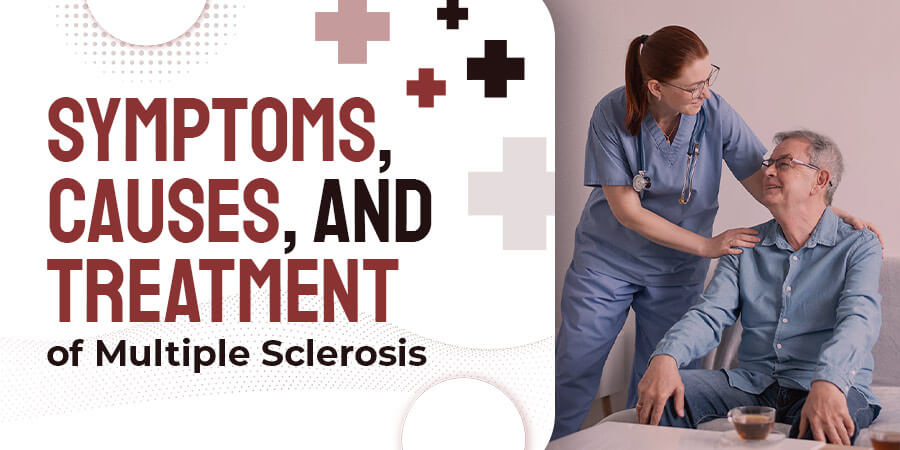To schedule an appointment call: 1 (800) 605-0031
To schedule an appointment call: 1 (800) 605-0031

Are you familiar with multiple sclerosis (MS)? It is a chronic autoimmune condition that involves the central nervous system (CNS). In people with MS, their immune system attacks myelin, which is a protective layer around nerve fibers. MS causes temporary lesions and inflammation. The lesions might also linger longer due to the scar tissue that interferes with messages in the affected areas of the brain and spinal cord. Unfortunately, there is no definitive cure, but if you learn everything about the Symptoms, Causes, and Treatment of Multiple Sclerosis, you should be able to manage the condition.
Folks with MS exhibit a wide variety of symptoms. Owing to the nature of this disease, our doctors at the Samaritana Medical Clinic have noticed that the symptoms can differ significantly from one patient to another.
Even the severity of the symptoms can change from time to time. Sometimes daily. Below, you will find a list of the most common symptoms of MS.
According to the National Multiple Sclerosis Society, almost 80% of people with multiple sclerosis report having fatigue. This fatigue makes performing daily tasks difficult.
Experiencing problems while walking is a common symptom among MS patients. This happens due to:
Vision problems are usually the first symptoms experienced by MS patients. They may affect one or both eyes. The issues can come and go, worsen over time, or resolve entirely. Here are the most common vision problems associated with MS.
Lesions in the brain caused by MS can distort speech. These speech-related problems are called dysarthria and can be mild, severe, or moderate. The symptoms of dysarthria include:
Here are a few other symptoms of MS:
Among Symptoms, Causes, and Treatment of Multiple Sclerosis, you already know the symptoms. Now, it is time to check out the causes. If you have this condition, myelin, or the protective layer around some of the nerve fibers of the brain, spinal cord, and optic nerve, gets damaged.
Our medical professionals believe this damage results from an autoimmune process in which the immune system attacks myelin. Further research is required, but an environmental trigger, such as a toxin or virus, may initiate the process.
Demyelination occurs once the immune system damages the myelin. This may go into remission with the formation of new layers of myelin. However, chronic inflammation can cause the development of scar tissue, which eventually manifests in the form of lasting neurological impairment.
Remember that MS is not hereditary, but if a parent or sibling has MS, your chances of sustaining it increase slightly. Medical researchers and scientists have pinpointed a few genes that can possibly increase susceptibility to developing this disease. This information is from a review of studies published in 2011.
No one, even experts, knows why some folks develop MS. Nonetheless, a few risk factors have been identified. They include:
As we have already mentioned, there is no cure currently available for multiple sclerosis, but treatment options can drastically limit relapses or slow down progression. Other medications and therapies can help manage various symptoms.
DMTs can slow the progression of MS and reduce relapse rates. For RRMS, there are self-injectable disease-modifying medications, such as glatiramer acetate (Copaxone) and beta interferons. A few examples worth mentioning include Avonex, Plegridy, Betaseron, Extavia, Rebif, etc.
The FDA approved Kesimpta for treatment in 2020. It is an injectable monoclonal antibody treatment that can be self-administered. Oral medicines for RRMS include dimethyl fumarate, fingolimod, teriflunomide, etc. As for intravenous infusion treatments of RRMS, doctors prescribe alemtuzumab, natalizumab, mitoxantrone, etc.
The FDA approved the first DMT for individuals with PPMS back in 2017. An infusion drug called ocrelizumab can also be used to treat RRMS.
There is another drug called ozanimod. It has been recently approved for treating RRMS, CIS, and SPMS, but not all MS medicines are available or appropriate for every patient. Speak to your doctor about which drugs are perfect for you and the risks and advantages of each.
MS specialists working with our Senior Care Los Angeles expert may prescribe corticosteroids, such as methylprednisolone or Acthar Gel, to treat relapses.
Other treatments may also be targeted at easing certain symptoms to help improve the patient’s quality of life, such as helping to treat pain or bladder urgency.
In short, treatment depends on a patient’s exclusive symptoms since they are different for everyone.
Do not let the Symptoms, Causes, and Treatment of Multiple Sclerosis scare you. It is a lifelong condition, which means you cannot get rid of it entirely, and you cannot let it worry you. However, the truth is that you will face unique challenges that can change over time.
Always discuss your concerns with a doctor from Samaritana. In doing so, you can gather as much information about MS as possible and find out what makes you feel best.
Some people with MS even share their challenges and coping strategies through in-person or online support groups.
A1. Early diagnosis of MS is possible but challenging because symptoms may be subtle or mimic other conditions. MRI scans and spinal fluid tests help detect early signs.
A2. While no specific diet cures MS, nutrient-rich foods like omega-3s, antioxidants, and vitamin D may support immune function and overall well-being.
A3. Chronic stress may trigger or worsen MS symptoms by increasing inflammation. Managing stress through meditation, exercise, and proper rest is highly recommended.
A4. Some people with MS report symptom flare-ups in hot or cold weather due to nerve sensitivity. Staying hydrated and cool may help.
A5. Yes, targeted exercises can strengthen muscles, enhance coordination, and improve balance, helping MS patients maintain mobility and independence over time.